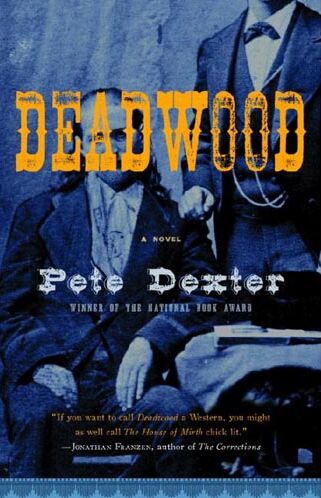Deadwood
Pete Dexter (1986)
The boy tried to be helpful, but anything he couldn't break, he lost. The more Charley studied his awkward deportment, the more he wondered at the unreliable nature of human jizzom. (3)
Bill shook his head. "There's something here for us," he said. He looked up and around, and Charley believed that in his own way Bill could see the hills around them clearer than he could. It had something to do with the way things connected for him. "You don't wind up in a place like this for no reason," Bill said. (20)
He'd made more money than any miner he knew, and held on to most of it. He'd been shot twice in the legs by accident, hunting, but he'd never had to pull a gun on a living soul. As much as you can, he'd even gotten married on purpose. (26)

Bullock never acknowledged the head. Boone was watching to see if he was squeamish at heads, but it didn't do a thing, any more than it had for Lurline. Boone didn't know where the fault lay, but socially, Frank Towles's head was a failure. (33)
"What insult to God is that," Solomon said, pointing at the desk.
"It's Frank Towles," Boone said. He watched Solomon Starr, and was grateful to see there was still somebody that cared about a human head. (34)
It seemed different to Boone, put that way. The line between right and wrong was the law, and if you kept between it, there wasn't much you couldn't do, if you used common sense who you done it to, and kept it out of view. (56)
He looked at a story about a new gun they had out in California that spit seventy rounds in four seconds. They called it the "Peace Conservator." They were always doing some damn thing in California that nobody had thought out the consequences. (84)
"See," Bill said, "you married on a different level. A girl like that can't understand people like us." (98)
If you wanted to know who somebody was, set them down next to a gold claim. Charley had seen common people cheat their brothers and fathers, abuse their wives and leave their children to get close to gold. Mostly, they acted on the assumption they could come back and straighten it all out after they were rich. They believed gold healed, too.
And there wasn't a man in a hundred who doubted he could handle it. The softest-brains in the Hills, the kind that couldn't buy new boots without having their own dog piss all over them, would all assume they could handle money. (99-100)
The way he thought of it then, his wife had expected things of him, and he had expected things of himself. She wanted to be comfortable—how she lived, and in the way people thought of her. He saw that he must have wanted some of that too, he didn't marry her for nothing. He'd joined the Congregational Church and then the Temperance Union. There had to be some reason for things as unnatural as that. (126)
Charley had been interviewed a dozen times, had his picture taken twice. They asked you questions, and then wrote answers in the paper that you didn't say. The lies were worse about Bill, who, of course, participated in them, saying any damn thing that came into his head to a reporter, figuring his imagination was as good as theirs. (128)
Charley wet his finger in the bottle and ran it over his eyelids. It was an Indian trick that gave you energy to keep drinking. (177)
She put the knife on the table next to the bed, where the man would see it, and lay down. An unconcealed knife threatened, no one. (211-12)
Pain was its own teacher, and there wasn't any way to learn how it worked but to be visited. If the visits weren't right on top of each other—if they were far enough apart so you could forget the way it came but close enough to remember it went away—you could learn te ride it out. (221)
The general had ordered all his officers and men to bathe, and more than one hundred of them had lined up outside the bath house. "They left all these bottles," the soft-brain said, and touched the sack.
Charley said, "Did you remember to charge?"
"American soldiers don't pay for nothing," he said.
"Who told you that?"
"Them." (266)
A man who owned Lurline's House of Distinction featuring the cream of the Hills' upstairs girls would be close to respectable in Deadwood, but it was a different circumstance in Lead. Lurline had told him there were already petitions to remove the business from city limits.
If there was one thing Charley hated, it was petitions. (308)
A wood plank sidewalk had been constructed on the east side of Main Street from the south end of town all the way to the bad lands, and Charley walked from one end to the other without muddying his pants. He considered civilization and progress, and wasn't against it as long as it wasn't planned more than two weeks in advance. (313)
She reached in with her fingers and found two teeth that moved when she touched them.
"Don't ever eat fruit," she said. The gambler smiled, but she saw he didn't understand. "I had the prettiest teeth in the West," she said, "but fruit rotted my gums." (329)
The Chinese never obeyed the white men's laws, though. They were afraid white men's laws led to white men's taxes. (355)
|



